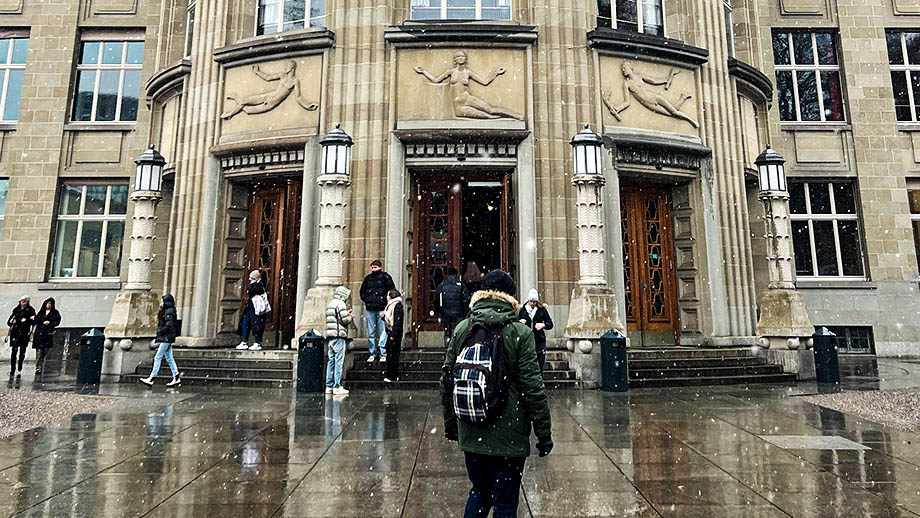Fully Prepared

“At the moment, energy shortages look unlikely, but they can’t be ruled out. That’s why we need to be prepared,” says Steve Jürkel, head of UZH’s Energy Shortage Management team.
As with the pandemic, UZH has put together a crisis management team to deal with potential energy shortages. The team is led by Steve Jürkel, who also headed up the Covid management team. In addition, UZH has established a scientific advisory group that is exploring the issue from a research perspective.
UZH wants to avoid drastic action and has already introduced a number of measures to save energy. But the university is also preparing a response in order to avoid (im)material and financial losses as far as possible should energy rationing or grid shutdowns become necessary.
Measures taken so far
As a cantonal institution, UZH implements the energy-saving measures decided by the Government Council of the Canton of Zurich. Specifically, this includes reducing exterior and interior lighting, unless needed for safety reasons. Dual-fuel installations at UZH have also been switched to using heating oil to preserve scarce gas supplies, and the target temperature in university buildings has been set to 20° C.
Moreover, since September, UZH has been asking its staff and students to help save energy. “Save electricity where it doesn’t hurt,” recommends Steve Jürkel. Devices shouldn’t be kept on stand-by, while fridges and freezers could be shared wherever possible in an attempt to reduce the number of appliances being used. Besides, regularly defrosting freezers generally saves energy. “These simple measures already go a long way,” stresses the head of UZH’s crisis management team.
UZH is also benefiting from the fact that it has already taken a close look at its energy consumption in recent years, which has led to crucial increases in energy efficiency. New research equipment requires less electricity than comparable old equipment. What’s more, over the past five years most of UZH’s light bulbs have been replaced with LED bulbs, which are more energy efficient.
If the situation worsens
Maintaining energy supply depends on how cold the winter is, how much electricity and gas can be imported, and whether unexpected events exacerbate the situation. The Energy Shortage Management team has developed different scenarios depending on how much electricity will be available. In any case, the amount of energy to be saved would be determined by the cantonal energy suppliers. The scenarios were designed to ensure that UZH’s core operations – teaching, research and clinical care – can be maintained as far and as long as possible.
If the situations worsens and energy rationing becomes unavoidable, the university’s sports facilities and car parks would likely be the first areas where energy use could be reduced. In addition, entire buildings used for administrative purposes might be closed. Energy rationing would definitely entail additional restrictions to our daily lives. “At the moment, however, we’re still far away from having to take such measures,” says Steve Jürkel.
If the lights do go out
Beyond energy rationing for major consumers like UZH, the federal government’s last resort would involve periodically shutting down the energy grid. UZH is also preparing for this worst-case scenario.
Should periodical shutdowns be decided, they would unavoidably have a dramatic impact on the university’s core operations. In this case, UZH’s main goal would be to avoid damages. And yet, even in this emergency, it would still be possible to keep Irchel Campus operational. “There are four emergency generators at Irchel Campus that can power the entire campus,” says Steve Jürkel. “We’ve also already bought large quantities of fuel reserves and tested the emergency generators.” This would enable researchers to bring their samples to Irchel and safely store them in fridges there to avoid damage.
Pitfalls of saving energy
Ensuring a target temperature of 20°C in UZH buildings isn’t as easy it may sound. According to Steve Jürkel, particularly in older buildings it’s technically impossible to control the exact temperature in all rooms.
Another challenge is the fact that around 75% to 80% of the energy used at UZH is due to its operating current, i.e. the amount of electricity that is used under normal university operations. Research activities account for a large part of this, for example for operating research equipment, ventilation systems and freezers. If research is to continue as before, it will be virtually impossible to save energy in this area.
“Some of the machines used for research virtually can’t be switched off, for example, MRI scanners,” says Steve Jürkel. Turning them off in an uncontrolled way would cause great financial damage. Therefore, if the grid is shut down periodically, the energy supply to machines like these would need to be maintained without interruption, either through batteries or generators.
Getting everyone on board
Steve Jürkel encourages researchers to take the initiative and voluntarily adopt energy-saving measures. For example, teams could share their lab freezers with other teams working next door, or researchers could share some of their other equipment. Autoclaves for sterilizing lab equipment could be run less frequently, and only when they’re full.
When it comes to teaching, Steve Jürkel doesn’t see that many additional ways in which energy could be saved beyond the already known measures, such as turning off lights and appliances, ventilating rooms properly, closing doors, taking the stairs rather than the lift and turning down the heating.
“Saving energy concerns our society as a whole,” says the head of UZH’s crisis management. Periodical shutdowns would affect us all, as they’d not only hit institutions like UZH, but households as well. That is why every effort counts, no matter how small.
Given the need to save energy, would it make sense for students to work from home? “No. Make sure you wrap up warm, but do come to uni as long as it’s possible. You have every right to do so,” recommends Steve Jürkel.